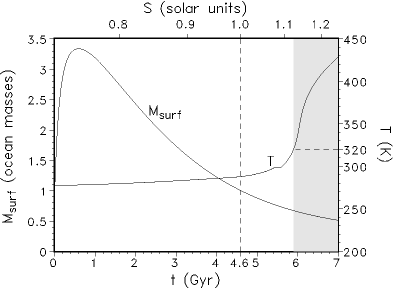
Potsdam Institute for Climate Impact Research (PIK), Telegrafenberg, P.O. Box 60 12 03, 14412 Potsdam, Germany.
Questions of how water arrived on the Earth's surface, how much water is contained in the Earth system as a whole, and how much water will be available in the future in the surface reservoirs are of central importance to our understanding of the Earth. To answer the question about the fate of the Earth's ocean, one has to study the global water cycle under conditions of internal and external forcing processes. Modern estimates suggest that the transport of water to the surface is five times smaller than water movement to the mantle, so that the Earth will lose all its seawater in one billion years from now. This straightforward extrapolation of subduction-zone fluxes into the future seems doubtful. Using our geophysical modelling approach we find that only 27 % of the modern ocean will be subducted in one billion years. Internal feedbacks will not be the cause of the ocean drying out. Instead, the drying up of surface reservoirs in the future will be due to the increase in temperature caused by a maturing Sun connected to hydrogen escape to outer space.
Keywords: Surface water reservoir, water fluxes, regassing, degassing, global water cycle.
Full text of article including figures as a PDF-file (190 KByte).

Figure: The evolution of the surface reservoir Msurf derived from the thermal evolution model, and of the mean global temperature T derived from the climate model of Caldeira and Kasting (1992). The region of temperatures higher than the critical value for the moist greenhouse model (Kasting, 1988) is shaded grey. The values for the solar luminosity S are given in the upper scale.